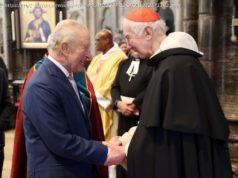Trump took a brief tour of the facility then spoke to an invite-only crowd of civil rights veterans, museum patrons and elected officials.
President Trump praised the work and sacrifice of civil rights activists Saturday during an appearance at the opening of the Mississippi Civil Rights Museum.
Trump took a brief tour of the facility then spoke for about nine minutes to an invite-only crowd of civil rights veterans, museum patrons and elected officials.
“These buildings embody the hope that has lived in the hearts of every American for generations. The hope for a future that is more just and is more free, » the president said.
He spoke of “the fight to end slavery, to break down Jim Crow, to end segregation, to gain the right to vote and to achieve the sacred birthright of equality.… That’s big stuff. Those are very big phrases. Very big words. Here we memorialize the brave men and women who struggled to sacrifice, and sacrifice so much, so that others might live in freedom.”
Read more: ‘We gave so much’: Reflections on Mississippi Civil Rights Museum
Read more: Civil rights: Top 5 must-see things at Mississippi’s new museums (and 1 bonus)
Trump mentioned Martin Luther King Jr., calling him “a man who I studied and watched (and) admired for my entire life.”
The president made special mention of Medgar Evers, the Mississippi NAACP field secretary who was assassinated in 1963. “He fought in Normandy in the Second World War” and returned to fight against “grave injustices against very innocent people.”
Trump ended his remarks by saying America must continue to build the future for which civil rights veterans have long fought. “Today we pay solemn tribute to our heroes of the past, and dedicate ourselves to build a future of freedom, equality, justice and peace,” he said.
Reuben Anderson, the state’s first African American Supreme Court justice, helped lead the private tour for Trump and Secretary of Housing and Urban Development Ben Carson. Trump appeared somber and shook his head as he was shown the room and exhibits dedicated to the Freedom Riders. The walls were lined with photos of those jailed and beaten for pushing for civil rights in Mississippi in 1961.
Anderson told the president about the Tougaloo Nine, college classmates who engaged in a sit-in at the Jackson Public Library in 1961.
« I didn’t have the courage to do what they did, » Anderson said. « They took their lives in their hands. »
Before Mississippi Gov. Phil Bryant introduced the president, Anderson told the invited crowd, “We’ve been through a whole lot, we’ve seen a whole lot, but we’re a forgiving and loving state… They took lives, they took a whole lot of things.”
The museum, he said, is “kind of a thank you” to those who made the sacrifices to secure equality.






